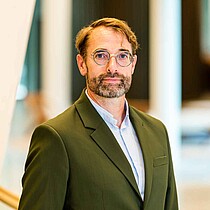

Article: Thursday, 17 July 2025
The thinking behind traditional economic models is becoming inadequate for addressing accelerating climate change and widening inequalities and has been challenged by Hans Stegeman, Chief Economist and Group Director of Impact and Economics at Triodos Bank. Hans’ research and analysis for his PhD thesis at Rotterdam School of Management, Erasmus University (RSM) used evidence from a massive global dataset that represents 89 per cent of global GDP. It indicates that environmental and social sustainability must become the foundation of economic policy, rather than an afterthought.
Stegeman analysed relationships between institutional arrangements and the UN’s Sustainable Development Goals for his Part-time PhD programme at RSM, with supervisor Prof. Dirk Schoenmaker. They concluded that mainstream economics is fundamentally ill-equipped to tackle ecological and social sustainability, and proposed a radical reimagining of how economic systems are structured and the transformation of economic thinking to unlock sustainable solutions.
This research arrives at a critical moment when policymakers around the world grapple with balancing economic recovery, climate action, and social equity.
"Current economic models fall short – they focus on growth and efficiency but don’t adequately account for ecological boundaries and social justice," argues Hans Stegeman. “Sustainability demands that the system changes, and that economic policy addresses broader forms of well-being beyond material prosperity or growth in GDP.”
Current economic thinking treats environmental degradation and inequality as external side effects rather than core concerns, he says, and his research suggests this approach is not merely insufficient; it’s counterproductive.
"We can no longer treat the negative effects of market interactions as external factors," explains Stegeman. “Negative effects must become the guiding parameters in the economy. This means fundamentally transforming how we think about economic success and policy.”
Traditional economic theory assumes that environmental and social problems can be solved through market mechanisms like carbon taxes or pricing externalities. Stegeman's research reveals the limitations in this approach, particularly when dealing with complex, interconnected systems. His analysis shows that economic growth via market mechanisms – which underpin current neoclassical economic models and institutional structures – promotes overproduction and consumption. It crowds out public goods, and depletes common resources. This ‘one size fits all’ economic design clearly fails to deliver sustainability.
“By recognising that an economy has different domains – economic, social, ecological – we can broaden the possibilities for integrating sustainability within the economic system," Stegeman notes. Each of these three domains has its own goals, actors, and success criteria, which sometimes compete and require trade-offs.
Stegeman’s research shows how constant economic growth nudges us closer to ‘tipping points’, the threshold at which a series of small changes result in a larger and irreversible change in the Earth’s systems. His research builds a theoretical model showing how the three different types of capital – natural, social, and economic – interact and influence each other. In the model, when social and natural capital are discounted, then tipping points approach with even greater speed. "We need policy that prioritises the sustainability of ecosystems and social institutions alongside economic growth," Stegeman emphasises. “We need to recognise the finite nature of natural resources and the importance of social solidarity.”
Hans Stegeman’s dissertation examined how different forms of capitalism perform against measures of sustainability using data from over 6,000 publicly listed companies across 42 countries. These data sources represent 89 per cent of global GDP. His findings reveal that different institutional clusters produce varying results for SDG performance, with trade-offs between ecological and social goals. Importantly, companies can influence SDGs independently, but this impact differs across institutional contexts.
"Companies in countries with advanced sustainability governance tend to lag behind, while companies in countries with weaker governance seem to lead," Stegeman observes. "This suggests countries and companies can sometimes, but not always, be seen as substitutes in driving sustainability."
So what’s the alternative?
Completely different approaches to economy and society based on different underlying worldviews often generate alternative solutions, says Stegeman. It’s these alternative approaches that are examined for their potential to address three sustainability challenges:
The conclusion is that the dominant worldview which puts individuals and hedonism first has actually hindered alternative economic solutions like sufficiency or community-based approaches.
"Deep transformations in institutions and worldviews are needed to give space to these new initiatives," he says, and gives five practical recommendations based on his comprehensive analysis:
Include non-monetised values and apply proper ordering of objectives and criteria to move beyond traditional cost-benefit analysis.
Develop forecasting models that capture the impact of economic activities on environment and society – including any non-linear effects – to provide policymakers with better insights into trade-offs.
Adopt more diverse approaches to economic analysis. This is especially important because traditional challenges like unemployment and monetary policy are increasingly influenced by social and ecological effects.
Reduce the dominance of companies and profit incentives by regulating competition, setting ecological boundaries, introducing different kinds of ownership structures, and emphasising profit moderation rather than maximisation.
Put more focus on phasing out unsustainable activities and encourage the lowering of financial leverage. Instead, finance only that which produces real economic activities, takes a long-term perspective, and produces more diversity in the financial sector.
Stegeman's research shows that making small adjustments to what’s already there is not enough to address sustainability challenges. Transformative change and a fundamental shift in how we understand economic success and well-being is needed.
His dissertation contributes to the growing amount of academic debate on post‑growth economics and institutional reform, and offers a comprehensive framework for understanding how economics can better serve sustainable societal transitions.
Chief Economist and Group Director of Impact and Economics at Triodos Bank


Science Communication and Media Officer
Rotterdam School of Management, Erasmus University (RSM) is one of Europe’s top-ranked business schools. RSM provides ground-breaking research and education furthering excellence in all aspects of management and is based in the international port city of Rotterdam – a vital nexus of business, logistics and trade. RSM’s primary focus is on developing business leaders with international careers who can become a force for positive change by carrying their innovative mindset into a sustainable future. Our first-class range of bachelor, master, MBA, PhD and executive programmes encourage them to become to become critical, creative, caring and collaborative thinkers and doers.
